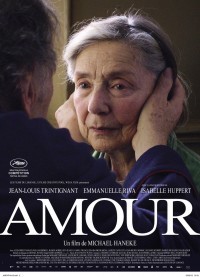Amour (2012)
If you are or have recently been a caregiver for a spouse, this Oscar-nominated Best Picture may be too raw and real for you to bear. However, send your adult children, your friends and others to see it before it leaves theaters or have them put it on their Netflix list so they can perhaps understand the daily emotional struggle that is (or was) your caregiving existence. For Amour captures perhaps the most realistic rainbow of caregiver emotions ever committed to film.
A brutally honest and beautifully done movie by Austrian writer-director Michael Haneke, Amour stars two nearly forgotten 80-years-young icons of French cinema, Jean-Louis Trintignant (When a Man Loves a Woman – 1966) who plays Georges, and Emmanuelle Riva (Hiroshima Mon Amour – 1959) who plays his wife, Anne. It captures the crisis and decline of both the afflicted and their loved one when it comes to caregiving. Families typically encounter caregiving after a traumatic event, in this film it is Anne’s stroke that unsettles the satisfying routine existence of this octogenarian couple living in Paris. Haneke makes us voyeurs in this intimate story. We watch over subsequent months and years while Anne’s health declines with the film never flinching from difficult scenes of real caregiving such as incontinence, bed sores, feeding, bathing, dressing. All the while Georges struggles in desperation to lovingly keep Anne comfortably at home and honor her wish to never return to the hospital.
While these promises are made to appease the fears of our loved ones, it is the caregiver who suffers through the fulfillment of this wish, a scenario poignantly brought to the screen by Trintignant. While Riva is Oscar-nominated for Best Actress, and I am not detracting from her physically challenging role and stunning performance as a stroke victim, it is Trintignant that I felt delivered a quiet yet pitch perfect portrayal as the caregiver who shoulders the burden alone. He is physically caring for the woman he fell in love with as a young man (we see the early images of their marriage in a scene where Anne looks through an old photo album), but she is no longer this woman and the fear, frustration, anger and sadness he feels are like exclamation points that jolt us into thoughtful contemplation about quality of life at the end of our lives and the fall-out for our loved ones. Georges is gentle, sweet, patient but the marathon of caring for Anne and watching her daily decline is wearing on him – few people can maintain this level of saintliness.
While the film focuses primarily on the interaction of Georges and Anne, their 50-something daughter, played with just the right touch of petulance, fear and indignation by Isabelle Huppert (who is actually 59), is emblematic of the difficulty adult children have in understanding the decline of their parents. Our parent is vulnerable and perhaps abandoning us as death draws near and we insist on living in denial to their departure. We refuse to accept their “exit strategy.” The film also touches on the compassion of some home health aides and incompetence of others. We also witness the kindness of neighbors. But despite these interactions, the profound isolation and loneliness of the husband/caregiver, Georges, is the anchor of the film and is never more intensely felt than when he is plucking the buds off the flower stems at the end of the movie.
I found the most poignant part of the movie when the son-in-law asks Georges, “How are you managing all this – we need to do something.” Georges responds with, “You have a better idea?” In other words – family who are not in the day-to-day caregiving struggle have NO idea of what caregiving is really all about. For Georges there is no escape and yet you know he does not want to escape as much as change their lives back to what it once was. Georges has become reconciled to the fact that Anne is not who she once was. This sad reality makes the ending to the movie less about shock-value than about provoking thought. Haneke passes no judgment on his characters and neither do we. As we watch the twilight of Georges and Anne’s love story, we know that twilight will come for us one day and it provides the audience with a touch of compassion.
I found the Paris location – although we see none of the romantic sites that typically pepper films about the city of lights and love – ideal for the movie’s setting. The message here is that even in the beautiful, lover’s paradise of Paris, aging and death finds us all.
This is a quiet movie that should have all of us talking about caregiving. And it is for that reason I recommend families see it either together or separately to provide greater understanding to what all of us are feeling when it comes to end-of-life issues and caregiving. Rather than becoming depressing and maudlin, Amour is simply about life and the message that we must quietly accept death – we must face it because it faces us. In the end, if we have love, that may be all that matters. C’est la vie – c’est l’amour.




I couod not refrain from commenting. Well written!
Thanks – we love our reader feedback!